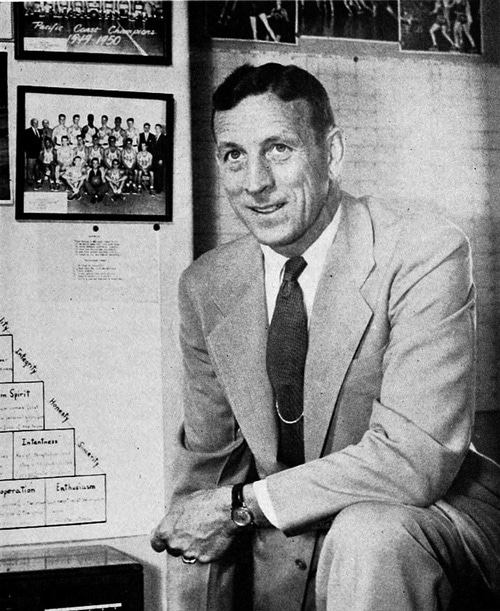
Coach John Wooden famously urged everyone to “make every day a masterpiece.”
Perhaps his most enduring legacy will be his example, his own life as a ‘masterpiece of service.’
Coach Wooden has a prominent place in my book, Serve to Lead. In fact, there is no better exemplar of the Serve to Lead principles.
1. Coach Wooden Defined Leadership Through Service. A constant in Wooden’s life was his commitment to his Christian faith. Through his daily prayers for guidance, and his oft-expressed gratitude, Wooden maintained his focus on those he was serving.
His definition of success:
Success is peace of mind, which is a direct result of self-satisfaction in knowing you made the effort to do your best to become the best that you are capable of becoming.
Implicit and explicit in the pyramid: one achieves one’s greatest contribution by self-forgetfulness. As he achieved ever-increasing success by the unmistakable metrics of college basketball, Wooden evaluated his players’ contribution by their performance as team members, not solely as individuals. Removing the ego displaced a major impediment to an individual’s achieving his own greatest contribution. So, too, serving others could result in a multiplier effect of team achievement.
2. Character is a Competitive Advantage: Many people believe—or assume without reflection—that the self-forgetfulness underlying traits of “character” puts one at a disadvantage in competitive realms such as business or sports or, for that matter, life generally. That is, they presume that putting others first is inconsistent with ultimate achievement.
Wooden stands in sharp rebuke to such notions. He recognized that traits of character–of service–could unleash ever greater contribution. Thus he maintained close attention to his players’ performance off the court, in the classroom. In best serving them as individuals, he could best serve the enterprise as a whole.
Today, in a world of radical transparency, Wooden’s insight is all the more important–and, as argued in Serve to Lead, character is, increasingly, a competitive advantage.
3. You Can Lead in Any Position, At Any Time in Life: Wooden’s extraordinary success as a coach came to an official close with his retirement in 1975. His influence and contribution continued, indeed expanded in subsequent years. He certainly did not allow his service to be circumscribed by anyone else’s misbegotten notions of what older people can–or cannot–do.
Wooden, of course, was a leader throughout his life. He was both a Hall of Fame player and coach. One reason this is so striking is that many people see performing as a player as an individual endeavor; a coach, in contrast, serves by eliciting the best performance from others.
Wooden’s focus on service was the golden thread bringing together all his endeavors.
So too, Wooden’s view of leadership came to be recognized as applicable in any setting, beyond basketball, beyond sports. In every field where personal performance is the key to value creation–which means everywhere–his lessons have been studied and applied.
He maintained his service as an educator for the remainder of his life. Now, through his accomplishments, writings and example, Wooden’s service continues.
4. What You See Is What You Get: When I wrote Reagan on Leadership, I was told by numerous people who knew and observed Reagan up close over the years: ‘With Reagan, what you see is what you get.’
By all accounts, the same is true of Wooden. He strove to live his values. He was not a different person behind closed doors or away from the cameras. He was famously dedicated to his beloved wife. He held fast to his ethical compass, not yielding to the temptations to cut corners that have ensnared so many big-time coaches. He kept his own counsel. Like Reagan, this included having a sense of knowing when it was time to go, leaving the stage of college coaching while his audience clamored for more.
If Wooden’s precepts sometimes seem simple, that does not mean they’re easy.
Perhaps the secret is: there is no secret. There’s just the mastery of struggle and striving, making each day a masterpiece as best one can, with faith it will all come together, without distractions of self-concern.
5. Wooden’s Generation Did Their Part—Will We? Coach Wooden died at Ronald Reagan UCLA Medical Center. He was born just months before Reagan, departing just shy of his 100th birthday.
Depending on one’s definition, Wooden, like Reagan, was part of what Tom Brokaw called “The Greatest Generation.”
There is, now and again, some push-back against that term. After all, other generations of Americans—think of the Founders, the Civil War generation, and so on—have also been extraordinary. And there are, of course, extraordinary people in less spectacular times.
Granting all that, the Wooden-Reagan generation was great. Or, more aptly,is great—because their example is very much with us today.
They lived through—and mastered—challenges and changes that, thus far, dwarf those of our own.
Hopefully we will not face such existential challenges. Yet, we can be inspired by their example.
It was heartening that so many young people gathered to pay homage to “The Coach” in his final days.
Will we make our own times a masterpiece of service?
As the Coach might have said, we just have to begin minute by minute, hour by hour, by making this day a masterpiece.
The Coach told us how to think about it—and showed us how it is done.
That is the John Wooden legacy.
Thank you, Sir.
Los Angeles Times: “Woodenisms”
John Wooden Legacy | A Masterpiece of Service
